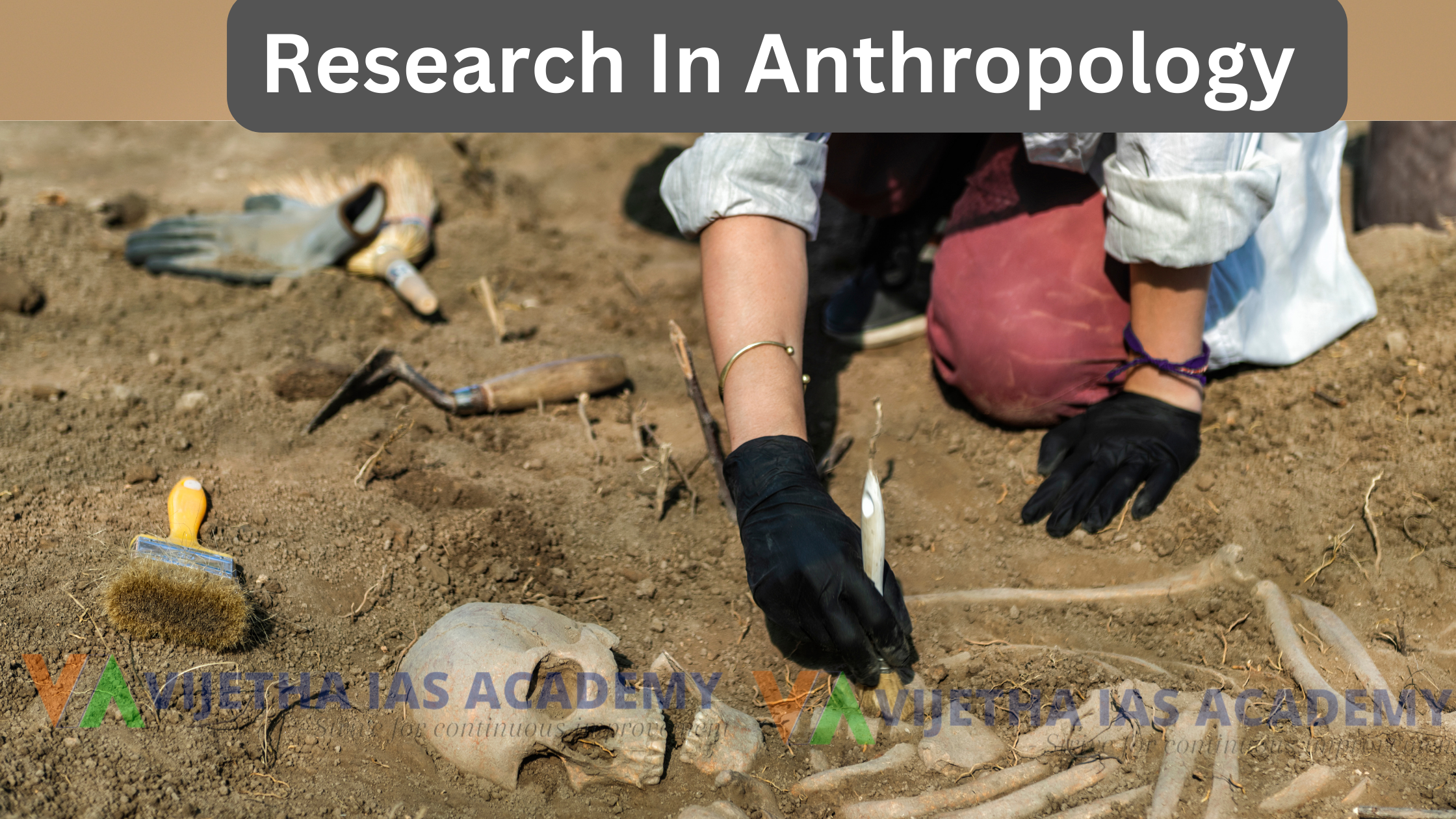
Unlocking the Potential of Research Anthropology: A Strategic Approach for UPSC Aspirants
In the pursuit of success in the Union Public Service Commission (UPSC) Civil Services Examination, aspirants are often faced with the crucial decision of selecting an optional subject. Among the diverse array of options available, Research Anthropology emerges as a strategic and intellectually stimulating choice. This article delves into the significance of Research Anthropology in the UPSC examination, the advantages of expert guidance from Vijetha IAS Academy and Kishore sir, and provides strategic insights for excelling in this subject.
Understanding Research Anthropology
Research Anthropology, also known as Methodological Anthropology, encompasses the study of research methods and techniques used in anthropological inquiry. It explores the process of conducting ethnographic fieldwork, collecting and analyzing data, and interpreting findings. By examining the methods and methodologies employed in anthropological research, scholars gain insights into the complexities of studying human societies and cultures.
Why Choose Research Anthropology as an Optional Subject?
-
Methodological Focus: Research Anthropology provides a comprehensive understanding of research methods, techniques, and approaches used in anthropology. This knowledge is invaluable for aspirants seeking to conduct research or pursue careers in academia, policymaking, or development work.
-
Analytical Skills Development: The systematic study of research methodologies enhances critical thinking, analytical reasoning, and problem-solving skills. These skills are essential for analyzing complex social phenomena, interpreting data, and drawing meaningful conclusions.
-
Applicability to General Studies: Many topics within Research Anthropology overlap with General Studies papers, particularly in areas such as research methodology, data interpretation, and evidence-based decision-making. This overlap can enhance an aspirant's overall preparation, providing a deeper understanding of related subjects and saving valuable study time.
-
Interdisciplinary Perspective: Research Anthropology integrates concepts from anthropology, sociology, psychology, statistics, and other disciplines, providing a multidimensional approach to understanding human behavior and society. This interdisciplinary perspective fosters a holistic understanding of research processes and methodologies.
The Role of Vijetha IAS Academy
Effective preparation for UPSC requires the right guidance and resources. Vijetha IAS Academy is a renowned institution offering specialized coaching for Anthropology optional subjects, including Research Anthropology. The academy’s structured courses and experienced faculty provide a comprehensive and strategic approach to mastering the subject.
Features of Vijetha IAS Academy's Anthropology Program
-
Expert Faculty: The academy boasts a team of expert educators, including renowned faculty members like Kishore sir, who have extensive experience in teaching Anthropology. Their deep understanding of Research Anthropology ensures high-quality instruction.
-
Comprehensive Study Material: Vijetha IAS Academy offers meticulously prepared study material tailored specifically for the UPSC syllabus. This material is continuously updated to reflect current trends and incorporate recent developments in the field.
-
Interactive Learning Environment: The academy promotes interactive learning through regular doubt-clearing sessions, group discussions, and mock tests. This approach helps students clarify their concepts and develop critical thinking skills.
-
Personalized Mentorship: Individual attention and personalized feedback are integral to the academy’s teaching methodology. This ensures that each student's unique needs and challenges are addressed, optimizing their preparation.
Guidance from Kishore Sir
Kishore sir, a distinguished faculty member at Vijetha IAS Academy, is known for his expertise and impactful teaching methods in Research Anthropology.
Why Choose Kishore Sir for Anthropology Optional?
-
In-Depth Knowledge: Kishore sir's profound understanding of Research Anthropology enables him to deliver comprehensive and insightful lectures. His ability to simplify complex concepts makes learning more accessible and enjoyable.
-
Structured Teaching Approach: Kishore sir follows a structured methodology that ensures thorough coverage of the syllabus. His systematic approach helps students grasp the subject matter effectively and efficiently.
-
Focus on Answer Writing: Emphasizing the importance of answer writing, Kishore sir provides detailed feedback on students’ answers, helping them refine their writing skills and improve their presentation. This practice is crucial for scoring high marks in the exam.
-
Mentorship and Motivation: Beyond academic guidance, Kishore sir offers mentorship and motivational support, helping students navigate the challenges of UPSC preparation. His encouragement and advice play a vital role in maintaining aspirants' morale and focus.
Strategies for Excelling in Research Anthropology
-
Understanding Research Methodologies: Develop a thorough understanding of different research methodologies, including ethnography, surveys, interviews, and participant observation. Familiarize yourself with the strengths, limitations, and ethical considerations associated with each method.
-
Practical Application: Apply theoretical knowledge to practical scenarios by conducting small-scale research projects or case studies. Practice designing research proposals, collecting data, and analyzing findings to strengthen your research skills.
-
Data Interpretation: Hone your skills in data interpretation and analysis. Learn how to organize data, identify patterns, and draw meaningful conclusions. Practice using statistical tools and software for data analysis, if applicable.
-
Critical Thinking: Cultivate critical thinking skills by critically evaluating research literature, identifying gaps in existing knowledge, and proposing innovative research questions. Develop the ability to think analytically, creatively, and objectively.
-
Effective Communication: Master the art of communicating research findings effectively. Practice writing clear, concise, and coherent research reports, essays, and presentations. Pay attention to formatting, citation styles, and academic conventions.
-
Stay Updated: Keep abreast of recent developments and debates in the field of Research Anthropology. Engage with contemporary research literature, attend conferences, and participate in academic discussions to stay informed and inspired.
Conclusion
Choosing Research Anthropology as an optional subject for the UPSC examination can be a strategic and rewarding decision. With its methodological focus, analytical skills development, and interdisciplinary perspective, it offers a unique advantage to aspirants. Success in this subject requires a combination of dedicated effort, strategic planning, and expert guidance. Institutions like Vijetha IAS Academy and mentors like Kishore sir provide the essential support and resources needed to excel. By leveraging these opportunities and following a disciplined approach, aspirants can significantly enhance their chances of achieving success in the UPSC examination.
